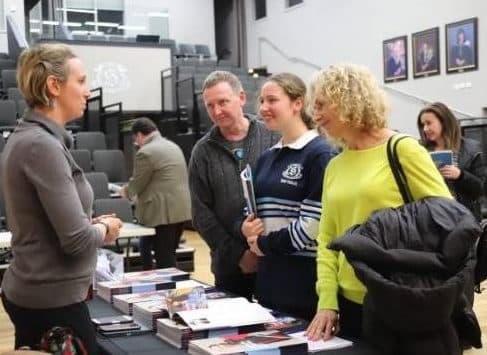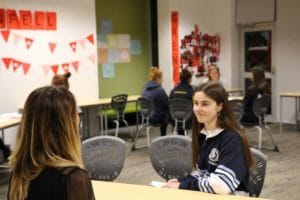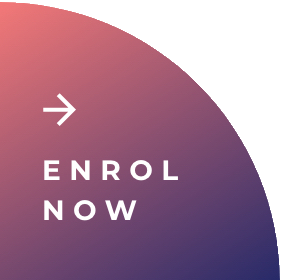
Conversations with students about study and career directions are interesting and varied. Some students have a clearly established study pathway with a specific vocational outcome, such as a physiotherapist, an accountant or a graphic designer. However, a common theme with many is the uncertainty of what lies before them. They are unable to commit themselves to anything too specific at this time of their lives. Some are relaxed about this, although others are a little anxious about their perceived ‘failure’ at finding a niche for themselves and concerned that without this direction they will drift along and not find a successful and rewarding career outcome. Though, even a direct vocational pathways, such as medicine or law, requires many skills not prescribed within the university curriculum.
Opportunities like the Strathcona Careers Night provides all of our students the chance to explore their interests, irrespective of where they are in their future planning. With access to over thirty of our past alumnae from a variety of industries and varied career journeys students appreciated hearing about experiences in study and work.
For some of our students, they were able to gain specific information about courses and vocations that they were planning to pursue. Whilst others found some reassurance in hearing stories of uncertainty and various changes of direction from alumnae whose plans were often just as uncertain when they were at School. Importantly, they could see positive outcomes, and in many cases, pick up some valuable tips on what to do to clarify their thinking.
A recent State Education Department review has raised the question of younger students being exposed to the world of work, and from this perspective it was encouraging to see a number of students at Year 9 level taking advantage of the opportunity to attend the night.
It is advised that moving into the next decade and towards 2030, today’s young people will need to build a portfolio of skills to thrive in the new work order. They will need to be:
- problem solvers and critical thinkers.
- communicators and engagers.
- versed in science, maths and technology knowledge.
(The New Work Smarts: Thriving in the New World Order: FYA 2017)
Importantly, when a young person connects with someone in a careers sense, they can also pick-up on what type of work skills are needed outside of the academic training from a University or College. Simple questions about day to day routines in a workplace, what sort of people you might have to work with, whether IT or mathematical skills are required, what is the best / worst thing about a particular job all help in this. The Careers Night provided the opportunity for these one-on-one conversations to develop and as a consequence, an understanding of how these generic skills compliment the more traditional course work.
It was gratifying to observe firsthand how wide ranging and animated these conversations were and have this reiterated in the feedback from the alumnae that I spoke to after the event.
For those who may not be ready to commit themselves to one particular direction just yet, a little advice. Use your subjects and interests outside the classroom to determine more general course offerings which will help you to continue learning in these areas when you leave school. This will involve talking to others. Share your various experiences and thoughts with your family and friends and invite them to give you advice and feedback.
It is true that your futures will not be delivered to you on a plate in these types of courses. However, you will have the opportunity to take control over the direction of your life. This may be a little daunting, but provides so many possibilities and opportunities. Your future is an exciting prospect.
Mr Mark Duncan, Careers/Studies Advisor


